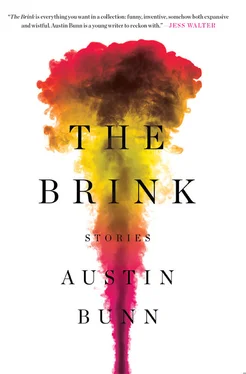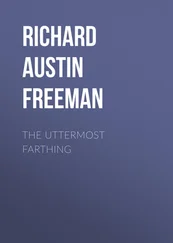“Why Diego?” I whispered. “Why did you save me?”
His eyes were soft. To my amazement, he took the ledger from my hand and lettered slowly. I had never seen him use a quill. For the first time, I heard his voice.
“YOUNG,” he wrote and pointed at my chest. “MORE LIFE.”
“But you have life too,” I said. “Why are you not afraid?”
He took up his lettering again. “SOMEONE I WISH TO SEE.”
A shudder traveled along my spine. Then Diego clutched me, and I felt a finality, as if he were trying to give over whatever part of him I hungered for. He felt solid and strong and then he was gone, crossing the deck to the cook box. Until dawn, he stoked the fires, preparing a breakfast of breads, served with the captain’s jars of prunes and jam. I came to him. “Diego,” I started, unsure of how to shape into words an ocean of feelings.
He pressed his pinched fingers at my lips. The last time I felt him alive. Powdered cinnamon dusted my mouth and exploded into a rounded, delicious silence.
At dawn, the crew mounted a torch to the prow of the longboat and cinched the long fathom line to an oarlock. The line would run from the longboat to the Elena , to keep it tethered. When the preparations were done, Diego and Ginés lowered the captain into the boat and set him in the bow. In his hand, he held the queen’s letters of introduction. At stern, Pinzón pleaded upwards. He’d spent the night writing letters to his wife. At dawn, he burned them all and wrote one to his mistress in Madrid, a letter he sealed with wax and swore me to deliver.
The sun rose as they set out, their oars slapping into a waveless ocean. The hemp line unspooled in lazy jerks. The captain peered out from the bow, his eyes fixed on the approaching ledge. Diego rowed and rowed, never looking up at me though I yearned for some last contact. On the Elena , no one spoke as the longboat shrank into the distance. When the second knot on the line passed over the gunwale, Alfredo called out, “Two fathoms gone!”
We never heard their cries. In an instant, the line unwound ferociously and the longboat vanished. The crew jumped on the rope and found themselves nearly propelled over. I grabbed the final length of line and tied it to the base of the main mast. When it uncoiled completely, the rope, three-fingers thick, sprang taut, and the mast groaned. The crew scrambled forward to regain a hold but could not pull the line back. We were strung tight; the fathom line ran from the Elena , through the air and over the ledge.
A monstrous pull tilted the ship sidelong and dragged her toward the drop. Everything on deck slid to one side.
Alfredo drew his knife and began to cut the line. But I couldn’t let him release Diego and the others to their death. If there is only this life — and nothing after — then it must be defended.
I met him at the rope, his blade already biting in, the line opening like tendon.
“You’ll kill them,” I said.
“They’re lost already,” he said. “We’ll go with them!”
I wrestled the knife from his hand and tossed it into the sea. Alfredo looked at me as if I were mad. Before I could move, I felt another blade across my throat.
“Cut it,” the English conscript called out from behind me.
Armando came to his brother’s side and continued the sawing with his own knife. But then my eye caught something out at the ledge: Diego, pulling himself along the rope, hand over hand, back to the Elena.
“Look!” Alfredo cried.
Armando stopped. The crew gathered at the line and hove. And this time, the line yielded, and we managed to reclaim it, until it was clear that we were pulling a weight far greater than just Diego. With a final heave, the tension on the line dropped and then we could see the longboat itself crest back through the spume and come to rest on the ocean surface. We had gaffed Diego back onto the deck — he rolled on his back and sank into a stupor — before I noticed the longboat was not empty.
A lone figure sat inside it. A woman.
She sat on one of the benches, in a high-waisted dress with flared sleeves and a heart-shaped hat. She was old and frail and dripping wet. Her skin looked as white as boiled bone.
“Where am I?” she called to us. “I’m frightened.”
I knew the Elena ’s bilge, awash with rotting food and piss, could inspire delusions. Ethers from belowdecks had been known to poison sailors with mirages, even throttle them in sleep. You could be surrounded by fresh sea air and your own ship could suffocate you. But we all saw this woman. Could every man be taken with the same dream?
Coralito peered out, his face blanched. His eyes hunted through his blindness. “Who is there?” he asked.
“A woman,” I said. “From beyond the ledge.”
“What is your name?” Coralito called out.
The woman swooned. “The sun is burning my skin. I must dry and get out of this heat.”
“What is your name!” Coralito called again. “Your name!”
The woman gasped. “Coralito?”
Coralito staggered back and crossed himself. “This cannot be,” he said.
“Tell us your name,” I called out.
The woman flapped her hat in her face. “My name is Isabela Hernandez Coralito, wife of Fernando Mancuello Coralito.”
Coralito hissed, “ She has been dead for six years .”
The woman cast a glance over her shoulder. “Please,” she said. “There are so many others waiting.”
We kept her in the longboat. All day the wraith cried out, demanding shade and water. Her voice was so human, so frail and chilling. She tried, fruitlessly, to paddle forward with her hands. When the sun continued to rise in a rinsed sky, she grew more urgent and pained. If she had been alive, truly alive, our treatment — watching an old woman wilt — would have been torture. Instead, as Coralito swore, his wife had passed away. He had set her tombstone himself.
At dusk, Diego gathered strength, though he was now ashen, his skin drained of color. I caved a blanket around him while he stared into the bowl of his hands. They were red and badly cut from his climb back to the boat, one wrist disjointed and swollen where he’d twisted it up in the line. He rehearsed his grip, opening and closing his fingers. I sat beside him, holding the ledger.
“Write,” I said. “Tell me. What did you see?”
I noticed, then, his wound: a deep gash at his right wrist that ran through to the other side. Inside, the tissue was gray. Every time Diego rotated his hand, the flesh opened like a mouth and did not bleed. He looked at it queerly.
His letters were feeble and wrong-handed. “DEAD?”
I felt a kick to my leg. “What’d he write?” the English conscript asked, peering on the page. “What’re those letters?”
“He’s weak,” I answered. “We need to leave him alone.”
The conscript sized me with cold eyes. “I served ten years for my crime. And you, for yours?”
At the sound of oars in the water, I pushed him off. I stood to see Alfredo and Armando in the fishing dingy. They approached the woman with a small skin of fresh water — their Christian duty — and a crossbow aimed at her chest. Coralito joined them. The dory held still at thirty strokes from the longboat.
“Fernando, why do these men hold their weapons at me?” she called out, nervously.
“Where have you come from?” Coralito asked. “I buried you.”
Her hand went to her chest. “What?”
“You died in our bedroom in Aragon, in my arms,” Coralito said. “We fell asleep and when I awoke you were gone, Isabela. This was six years ago.”
Isabela shook her head. “I don’t remember, Fernando. I don’t remember any of that.”
Armando and Alfredo rowed the dory closer and closer until it knocked the side of the longboat and Coralito stepped over to attend to his wife.
Читать дальше











